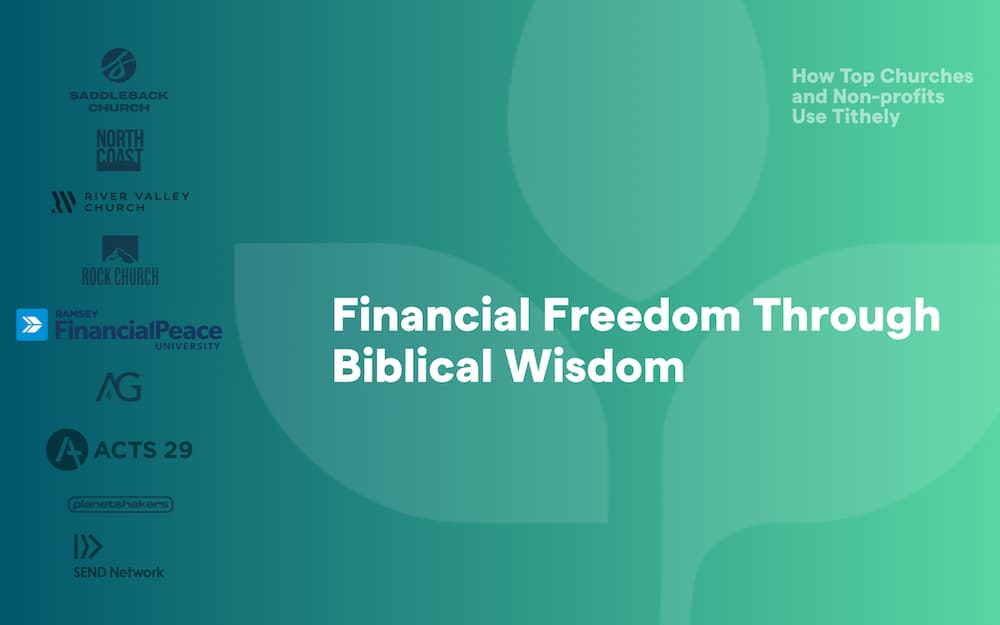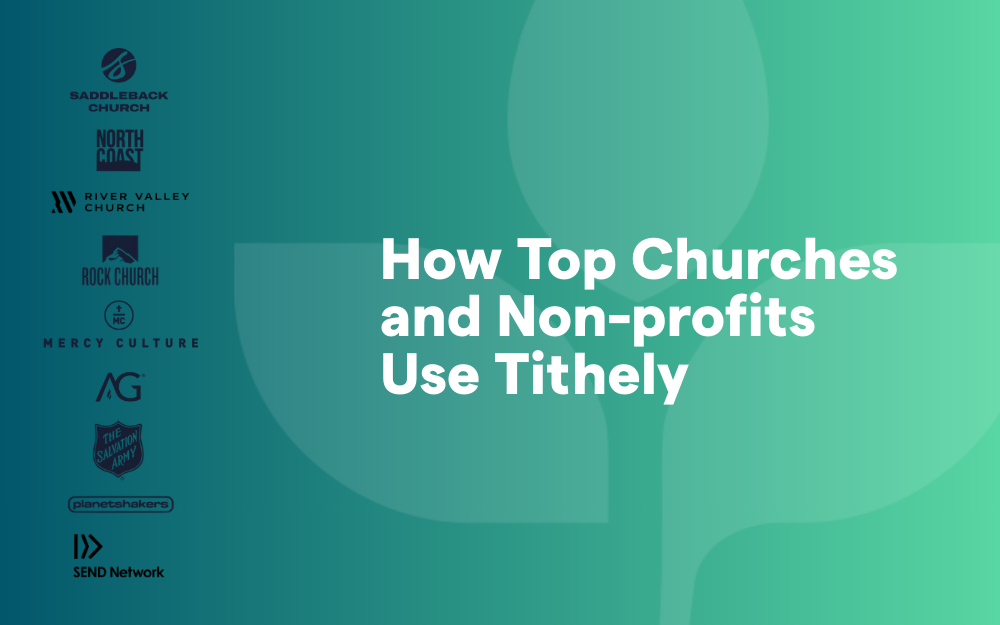Donate Bitcoin to Charity or Church
Discover how cryptocurrencies can benefit the work of ministry.
.jpeg)
Are you an investor wondering if you can donate Bitcoin or other cryptocurrencies to your favorite charity or local church?
Are you a pastor or church administrator wondering how you can accept Bitcoin?
Here are a few things you need to know.
Today, more and more non-profit organizations, charities and churches included, recognize that cryptocurrencies like Bitcoin, Litecoin, and Lithium are making inroads into the mainstream economy. So, it makes sense that many now accept crypto donations.
Just like the donation of stock or a physical asset—think cars and real estate—Bitcoin can be converted into dollars and be used to fuel ministry. And while the future of cryptocurrencies remains something of a mystery, for the time being many people are investing in these digital assets, and charities can benefit from them.
How does Bitcoin work?
For many people, apprehension about cryptocurrencies is caused by the fact that, quite literally, Bitcoin and the other crypto options out there can’t be held in your hand or placed in a safe. They don’t have a physical component, like dollars and cents do.
However, aren’t we all used to seeing our money represented by a number on a screen? Very few of us carry cash around in our pockets. We’re used to paying bills online and viewing our transactions on a digital balance sheet. In that sense, Bitcoin is no different.
Just looking at the value of Bitcoin over the past ten years or so reveals that it fluctuates with market swings. In that sense, many people think of cryptocurrencies the way they think of the stock market.
What makes Bitcoin different than cash or stocks, however, is how it’s used in the real world. In order to own cryptocurrencies, a person must have a digital wallet. Coinbase is the most popular option, but there are others to choose from.
Spending Bitcoin takes an extra step as well. Cryptocurrencies can be sold and exchanged for standard currencies and then simply spent. But increasingly, many merchants and non-profits have begun accepting crypto payments directly. For that, a service like Engiven can be used to process transactions.
Churches, get ready!
Way back in the ninth century, Muslim traders invented the ancestor of the modern check. Instead of traveling hundreds of miles with bags upon bags of coins, they devised a system in which a handwritten note could be used to tell a bank to make a payment on the account holder’s behalf.
I bring this up not only because I love a good dose of history, but because it illustrates an important truth: things change. Today, no one thinks twice about accepting a check as a form of payment, even though a check is just a piece of paper. But imagine the skepticism that had to be overcome the first time it was tried. The same is true with credit cards made of plastic, and even cash itself. A $100 bill is worth far more than the paper and ink in your wallet.
No one knows what the future holds for money, but right now, cryptocurrencies are making tremendous inroads, so churches and charities should begin accepting them as donations, if they already haven’t.
Tithe.ly recently announced a new strategic partnership with Engiven that will allow churches and organizations to accept Bitcoin and 22 other cryptocurrencies directly. If you’re an existing Tithe.ly customer, here’s all you need to do:
- Head over to https://tithely.engiven.com and sign up. To do so, you’ll need to create an account with Engiven.
- Next, you’ll get a button to add to your church’s website, right next to your Tithe.ly donate button.
- Voila! With that button in place, anyone visiting your church’s website can donate Bitcoin or 21 other cryptocurrency options.
A few things to keep in mind…
First, cryptocurrency donations won’t be included in your Tithe.ly account. Instead, you’ll be able to track and manage them in your new Engiven account.
Second, as a church or non-profit, you’ll probably want to convert any Bitcoin donations you receive into standard currency as soon as you receive them. That way, they won’t be subject to the ups and downs of the cryptocurrency market.
Over to you
Whether you’ve been buying Bitcoin since the beginning or are just discovering cryptocurrency, remember: there’s no substitute for generosity. No matter what the money in our accounts looks like, God wants our treasure to be in heaven. Meanwhile, here on earth, there’s kingdom work to be done, and it will take all kinds of currency.
Sign Up for Product Updates
Are you an investor wondering if you can donate Bitcoin or other cryptocurrencies to your favorite charity or local church?
Are you a pastor or church administrator wondering how you can accept Bitcoin?
Here are a few things you need to know.
Today, more and more non-profit organizations, charities and churches included, recognize that cryptocurrencies like Bitcoin, Litecoin, and Lithium are making inroads into the mainstream economy. So, it makes sense that many now accept crypto donations.
Just like the donation of stock or a physical asset—think cars and real estate—Bitcoin can be converted into dollars and be used to fuel ministry. And while the future of cryptocurrencies remains something of a mystery, for the time being many people are investing in these digital assets, and charities can benefit from them.
How does Bitcoin work?
For many people, apprehension about cryptocurrencies is caused by the fact that, quite literally, Bitcoin and the other crypto options out there can’t be held in your hand or placed in a safe. They don’t have a physical component, like dollars and cents do.
However, aren’t we all used to seeing our money represented by a number on a screen? Very few of us carry cash around in our pockets. We’re used to paying bills online and viewing our transactions on a digital balance sheet. In that sense, Bitcoin is no different.
Just looking at the value of Bitcoin over the past ten years or so reveals that it fluctuates with market swings. In that sense, many people think of cryptocurrencies the way they think of the stock market.
What makes Bitcoin different than cash or stocks, however, is how it’s used in the real world. In order to own cryptocurrencies, a person must have a digital wallet. Coinbase is the most popular option, but there are others to choose from.
Spending Bitcoin takes an extra step as well. Cryptocurrencies can be sold and exchanged for standard currencies and then simply spent. But increasingly, many merchants and non-profits have begun accepting crypto payments directly. For that, a service like Engiven can be used to process transactions.
Churches, get ready!
Way back in the ninth century, Muslim traders invented the ancestor of the modern check. Instead of traveling hundreds of miles with bags upon bags of coins, they devised a system in which a handwritten note could be used to tell a bank to make a payment on the account holder’s behalf.
I bring this up not only because I love a good dose of history, but because it illustrates an important truth: things change. Today, no one thinks twice about accepting a check as a form of payment, even though a check is just a piece of paper. But imagine the skepticism that had to be overcome the first time it was tried. The same is true with credit cards made of plastic, and even cash itself. A $100 bill is worth far more than the paper and ink in your wallet.
No one knows what the future holds for money, but right now, cryptocurrencies are making tremendous inroads, so churches and charities should begin accepting them as donations, if they already haven’t.
Tithe.ly recently announced a new strategic partnership with Engiven that will allow churches and organizations to accept Bitcoin and 22 other cryptocurrencies directly. If you’re an existing Tithe.ly customer, here’s all you need to do:
- Head over to https://tithely.engiven.com and sign up. To do so, you’ll need to create an account with Engiven.
- Next, you’ll get a button to add to your church’s website, right next to your Tithe.ly donate button.
- Voila! With that button in place, anyone visiting your church’s website can donate Bitcoin or 21 other cryptocurrency options.
A few things to keep in mind…
First, cryptocurrency donations won’t be included in your Tithe.ly account. Instead, you’ll be able to track and manage them in your new Engiven account.
Second, as a church or non-profit, you’ll probably want to convert any Bitcoin donations you receive into standard currency as soon as you receive them. That way, they won’t be subject to the ups and downs of the cryptocurrency market.
Over to you
Whether you’ve been buying Bitcoin since the beginning or are just discovering cryptocurrency, remember: there’s no substitute for generosity. No matter what the money in our accounts looks like, God wants our treasure to be in heaven. Meanwhile, here on earth, there’s kingdom work to be done, and it will take all kinds of currency.
podcast transcript
Are you an investor wondering if you can donate Bitcoin or other cryptocurrencies to your favorite charity or local church?
Are you a pastor or church administrator wondering how you can accept Bitcoin?
Here are a few things you need to know.
Today, more and more non-profit organizations, charities and churches included, recognize that cryptocurrencies like Bitcoin, Litecoin, and Lithium are making inroads into the mainstream economy. So, it makes sense that many now accept crypto donations.
Just like the donation of stock or a physical asset—think cars and real estate—Bitcoin can be converted into dollars and be used to fuel ministry. And while the future of cryptocurrencies remains something of a mystery, for the time being many people are investing in these digital assets, and charities can benefit from them.
How does Bitcoin work?
For many people, apprehension about cryptocurrencies is caused by the fact that, quite literally, Bitcoin and the other crypto options out there can’t be held in your hand or placed in a safe. They don’t have a physical component, like dollars and cents do.
However, aren’t we all used to seeing our money represented by a number on a screen? Very few of us carry cash around in our pockets. We’re used to paying bills online and viewing our transactions on a digital balance sheet. In that sense, Bitcoin is no different.
Just looking at the value of Bitcoin over the past ten years or so reveals that it fluctuates with market swings. In that sense, many people think of cryptocurrencies the way they think of the stock market.
What makes Bitcoin different than cash or stocks, however, is how it’s used in the real world. In order to own cryptocurrencies, a person must have a digital wallet. Coinbase is the most popular option, but there are others to choose from.
Spending Bitcoin takes an extra step as well. Cryptocurrencies can be sold and exchanged for standard currencies and then simply spent. But increasingly, many merchants and non-profits have begun accepting crypto payments directly. For that, a service like Engiven can be used to process transactions.
Churches, get ready!
Way back in the ninth century, Muslim traders invented the ancestor of the modern check. Instead of traveling hundreds of miles with bags upon bags of coins, they devised a system in which a handwritten note could be used to tell a bank to make a payment on the account holder’s behalf.
I bring this up not only because I love a good dose of history, but because it illustrates an important truth: things change. Today, no one thinks twice about accepting a check as a form of payment, even though a check is just a piece of paper. But imagine the skepticism that had to be overcome the first time it was tried. The same is true with credit cards made of plastic, and even cash itself. A $100 bill is worth far more than the paper and ink in your wallet.
No one knows what the future holds for money, but right now, cryptocurrencies are making tremendous inroads, so churches and charities should begin accepting them as donations, if they already haven’t.
Tithe.ly recently announced a new strategic partnership with Engiven that will allow churches and organizations to accept Bitcoin and 22 other cryptocurrencies directly. If you’re an existing Tithe.ly customer, here’s all you need to do:
- Head over to https://tithely.engiven.com and sign up. To do so, you’ll need to create an account with Engiven.
- Next, you’ll get a button to add to your church’s website, right next to your Tithe.ly donate button.
- Voila! With that button in place, anyone visiting your church’s website can donate Bitcoin or 21 other cryptocurrency options.
A few things to keep in mind…
First, cryptocurrency donations won’t be included in your Tithe.ly account. Instead, you’ll be able to track and manage them in your new Engiven account.
Second, as a church or non-profit, you’ll probably want to convert any Bitcoin donations you receive into standard currency as soon as you receive them. That way, they won’t be subject to the ups and downs of the cryptocurrency market.
Over to you
Whether you’ve been buying Bitcoin since the beginning or are just discovering cryptocurrency, remember: there’s no substitute for generosity. No matter what the money in our accounts looks like, God wants our treasure to be in heaven. Meanwhile, here on earth, there’s kingdom work to be done, and it will take all kinds of currency.
VIDEO transcript
Are you an investor wondering if you can donate Bitcoin or other cryptocurrencies to your favorite charity or local church?
Are you a pastor or church administrator wondering how you can accept Bitcoin?
Here are a few things you need to know.
Today, more and more non-profit organizations, charities and churches included, recognize that cryptocurrencies like Bitcoin, Litecoin, and Lithium are making inroads into the mainstream economy. So, it makes sense that many now accept crypto donations.
Just like the donation of stock or a physical asset—think cars and real estate—Bitcoin can be converted into dollars and be used to fuel ministry. And while the future of cryptocurrencies remains something of a mystery, for the time being many people are investing in these digital assets, and charities can benefit from them.
How does Bitcoin work?
For many people, apprehension about cryptocurrencies is caused by the fact that, quite literally, Bitcoin and the other crypto options out there can’t be held in your hand or placed in a safe. They don’t have a physical component, like dollars and cents do.
However, aren’t we all used to seeing our money represented by a number on a screen? Very few of us carry cash around in our pockets. We’re used to paying bills online and viewing our transactions on a digital balance sheet. In that sense, Bitcoin is no different.
Just looking at the value of Bitcoin over the past ten years or so reveals that it fluctuates with market swings. In that sense, many people think of cryptocurrencies the way they think of the stock market.
What makes Bitcoin different than cash or stocks, however, is how it’s used in the real world. In order to own cryptocurrencies, a person must have a digital wallet. Coinbase is the most popular option, but there are others to choose from.
Spending Bitcoin takes an extra step as well. Cryptocurrencies can be sold and exchanged for standard currencies and then simply spent. But increasingly, many merchants and non-profits have begun accepting crypto payments directly. For that, a service like Engiven can be used to process transactions.
Churches, get ready!
Way back in the ninth century, Muslim traders invented the ancestor of the modern check. Instead of traveling hundreds of miles with bags upon bags of coins, they devised a system in which a handwritten note could be used to tell a bank to make a payment on the account holder’s behalf.
I bring this up not only because I love a good dose of history, but because it illustrates an important truth: things change. Today, no one thinks twice about accepting a check as a form of payment, even though a check is just a piece of paper. But imagine the skepticism that had to be overcome the first time it was tried. The same is true with credit cards made of plastic, and even cash itself. A $100 bill is worth far more than the paper and ink in your wallet.
No one knows what the future holds for money, but right now, cryptocurrencies are making tremendous inroads, so churches and charities should begin accepting them as donations, if they already haven’t.
Tithe.ly recently announced a new strategic partnership with Engiven that will allow churches and organizations to accept Bitcoin and 22 other cryptocurrencies directly. If you’re an existing Tithe.ly customer, here’s all you need to do:
- Head over to https://tithely.engiven.com and sign up. To do so, you’ll need to create an account with Engiven.
- Next, you’ll get a button to add to your church’s website, right next to your Tithe.ly donate button.
- Voila! With that button in place, anyone visiting your church’s website can donate Bitcoin or 21 other cryptocurrency options.
A few things to keep in mind…
First, cryptocurrency donations won’t be included in your Tithe.ly account. Instead, you’ll be able to track and manage them in your new Engiven account.
Second, as a church or non-profit, you’ll probably want to convert any Bitcoin donations you receive into standard currency as soon as you receive them. That way, they won’t be subject to the ups and downs of the cryptocurrency market.
Over to you
Whether you’ve been buying Bitcoin since the beginning or are just discovering cryptocurrency, remember: there’s no substitute for generosity. No matter what the money in our accounts looks like, God wants our treasure to be in heaven. Meanwhile, here on earth, there’s kingdom work to be done, and it will take all kinds of currency.




























